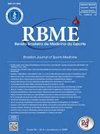抗阻训练对大学生体重的影响
4区 医学
Q4 Health Professions
Revista Brasileira de Medicina do Esporte
Pub Date : 2023-04-07
DOI:10.1590/1517-8692202329012023_0020
引用次数: 0
摘要
摘要简介:肥胖对大学生有着很大的负面影响,影响着大学生的身心健康。人们认为,阻力训练作为一种促进肌肉肥大的有氧运动,可以促进这类个体的减肥效果。目的:评价负重抗阻训练对大学生体重的影响。方法:将120名肥胖大学生志愿者平均随机分为两组进行实验。实验A、B组分别进行不同负荷的抗阻训练,对照组只进行常规有氧训练。收集干预前后患者的围视、BMI等身体指标进行统计分析和讨论。结果:实验结束后,A组体重由81.62±4.12变化为76.20±5.49,BMI由27.22±1.67变化为25.98±1.74,腰围由89.11±5.62变化为87、27±6.34,臀围由101.61±5.43变化为98.45±5.62,腰臀比由0.89±2.34变化为0.87±2.13,体脂比由27.58±3.83变化为22.61±2.99。实验A组在不同负荷的阻力训练后,数据也有显著变化。这些变化与实验B组相似,但对照组数据的变化未得到证实。结论:负重抗阻训练能帮助肥胖大学生改善身体成分和身体素质。证据等级II;治疗性研究——对治疗结果的调查。本文章由计算机程序翻译,如有差异,请以英文原文为准。
EFFECTS OF RESISTANCE TRAINING ON WEIGHT IN COLLEGE STUDENTS
ABSTRACT Introduction: Obesity has a great negative impact on college students, affecting their physical and mental health. It is believed that resistance training, as an aerobic exercise that promotes muscle hypertrophy, can promote an obesity-reducing effect in this class of individuals. Objective: Assess the effects of resistance training with loads on weight in college students. Methods: 120 obese college student volunteers were equally and randomly divided into groups for the experiment. The experimental groups A and B received resistance training with different loads, while the control group received only regular aerobic training. For statistical analysis and discussion, body indices such as perimetry and BMI were collected before and after the intervention. Results: After the experiment, the body weight of experimental group A changed from 81.62±4.12 to 76.20±5.49, BMI from 27.22±1.67 to 25.98±1.74, waist circumference from 89.11±5.62 to 87, 27±6.34, hip circumference from 101.61±5.43 to 98.45±5.62, waist/hip ratio from 0.89±2.34 to 0.87±2.13, and body fat ratio from 27.58±3.83 to 22.61±2.99. Significant changes were also noticed in the data of experimental group A after resistance training with different loads. These changes were similar to those of the experimental group B, but changes in the control group data were not evidenced. Conclusion: Resistance training with loads can help obese college students improve their body composition and physical quality. Level of evidence II; Therapeutic studies - investigation of treatment outcomes.
求助全文
通过发布文献求助,成功后即可免费获取论文全文。
去求助
来源期刊

Revista Brasileira de Medicina do Esporte
PHYSIOLOGY-SPORT SCIENCES
自引率
0.00%
发文量
204
审稿时长
6-12 weeks
期刊介绍:
The Revista Brasileira de Medicina do Esporte (RBME in its Portuguese form) is an official organ of the Sociedade Brasileira de Medicina do Exercício e do Esporte (SBME) Brazilian Society of Exercise Medicine and Sports) and represents the main promotion resource of the scientific production in the Exercise Sciences and Sports Medicine (SBME) fields in our country. The RBME was launched in 1995 with trimester periodicity and became regularly bi-monthly published with no interruptions from 1999.
RBME is an inter-and multidisciplinary, peer reviewed, Open Access journal which accepts contributions from the national and international scientific community. RBME publishes original articles of high scientific relevance in Exercise and Sports Medicine, review articles, and systematic reviews.
RBME preferably publishes original articles of international interest, not only of regional significance. Its goal is to disseminate the scientific production in the areas of exercise and sports medicine through the publication of original research results and other documents that contribute to the scientific and applied knowlewdge of physical activity, exercise and sports, within the framework of biological sciences and medicina.
Its title abbreviation is Rev Bras Med Esporte, which should be used in references, footnotes and reference subtitles.
 求助内容:
求助内容: 应助结果提醒方式:
应助结果提醒方式:


